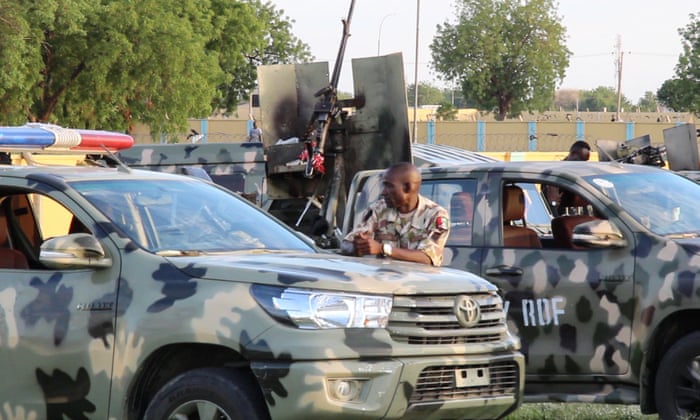Nigeria Under Strain
"If humanitarian agencies are kicked out of north-east Nigeria then thousands of Nigerian civilians will needlessly die, including many children – it will be a humanitarian disaster"
"{Someone needs to ask the Nigerians and the UN some serious questions about how the government of Nigeria is getting away with this while it sits on stage in New York, presiding over the UN general assembly and preaching about ending conflict and fighting poverty in the drive to reach the sustainable development goals."
Aid Agency Worker
"Action Against Hunger delivers neutral, impartial and independent humanitarian aid to millions of people in Borno and Yobe states by providing basic services to the most vulnerable people, especially women and children."
Action Against Hunger
 |
| Soldiers block the entrance of the aid agency Mercy Corps’ office in Maiduguri after closing it down. Photograph: Audu Marte/AFP/Getty Images |
Nigeria, the most populous of African countries and the most wealthy in natural fossil fuel resources, with its population split between Christians and Muslims has been incapable of defending its people and ridding itself of the dominating, murderous curse of Boko Haram, Islamist jihadists. Its military has been underfunded, foot soldiers using decrepit old weapons, corruption in both the military elite ranks and the government itself at every level is legendary. And ordinary people suffer.
For ten years Nigerians have been victimized by the brutality of the Islamists and the fecklessness of the government. The Islamist extremists have declared war and the government has responded half-heartedly. Allocating more funding to the military, acquiring newer weapons, all the while that Boko Haram is arming itself with even better weapons. Some, in fact, from abandoned armouries looted by the vandals when troops retreat, anxious for their own safety, abandoning their posts.
It's a strategy-without-honour seen played out years ago in Iraq when Islamic State marched on Mosul, the Iraqi defence forces scurried off, allowing ISIL to loot the national treasury of almost a billion dollars and take possession of the hastily departing Iraqi military's weapons caches and vehicles, courtesy of U.S. generosity in the fight against terror. President Muhammadu Buhari's re-election had him boasting about making spectacular progress in defeating Boko Haram; "technically defeated".
A term that has little meaning to the farmers and villagers whose livelihoods have been destroyed, villages emptied, men killed, women kidnapped and raped. Despite the government having 'defeated' Boko Haram, they have now control of four of the ten areas in northern Borno State close to Lake Chad. From their jumping off spots they continue to mount raids on an almost daily schedule. So the people living there don't think much of the defeat of Boko Haram.
The Nigerian military is in a congenital state of demoralization. Initially it was because the military was underfunded, the soldiers not well trained or armed. Now they're on the defensive as well as being demoralized, as though they realize they aren't capable of winning in a fight against the terrorists. Some in the military point out their vehicles and weapons have fallen into disrepair; their organizational skills leave much to be desired.
But a new tactic has gained sway, with the military announcing plans to pull back troops from isolated outposts to gather them within fortified settlements called "super camps" installed inside garrison towns where tens of thousands of civilians have been settled. They're there because either Boko Haram ousted them or soldiers burned their villages, rounding them up with claims this would secure the countryside. Trenches ring the garrison towns in hopes of deflecting invasions by the terrorists.
The end result of this bold new direction in military tactics has been to give Boko Haram free reign in the countryside, barren of its inhabitants. When President Buhari was first elected there was headway made against Boko Haram by the Nigerian military, with fighters routed from the state capital of Maiduguri and small cities taken by Boko Haram, pushing them back toward their forest barricades.
The military commanders in the face of criticism over strategy now say the super camps represent a more effective way of dealing with an insurgency whose attacks against the military are more complex. Among some officials the super camps represent an outright retreat, with one federal official characterizing the new strategy as jeopardizing the situation even further with soldiers barricading themselves out of harm's way.
Giving Boko Haram the opportunity to raid the gear soldiers leave behind them while abandoning their posts for the security of the super camps. According to locals, some soldiers have been seen to flee in the face of attacks, preferring not to remain in fighting mettle. Outside the military's reach, people tolerate the presence of militants because they can do nothing else after returning to their farms, preferring to earn a living rather than submit to crowded camps where cholera and other diseases lurk.
The government itself has turned its attention on the presence of humanitarian groups in the country, doing their utmost to provide medical care and food to Nigerians living in dreadful straits. Inexplicably, the government has charged these charitable groups with using their funding in support of Boko Haram. Aid offices have been closed down after being charged with aiding and supporting Boko Harm or Islamic State West Africa Province (ISWAP).
This is a country totally at the mercy of an ineffective government with little idea how to cope with the threats within, and turning instead to outside agencies to blame them for the hopeless inadequacy of their responses to the terror within.

Labels: Boko Haram, Government Incapacity, Nigeria, Terrorism

<< Home